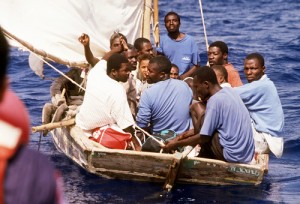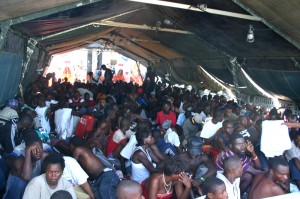This Week in Guantánamo: 1992 and 2012
This Week in Guantánamo: Present and Past
2012:
This week, in the first ever plea deal between a “high value” detainee and the U.S. government, Guantánamo detainee Majid Khan pleaded guilty to terror charges. Deemed a “high value” prisoner by President George W. Bush, his charges include conspiring with al-Qaeda, murder, and attempted murder. As a condition of his plea agreement, he must testify against other terrorism suspects, including Khalid Shaikh Mohammed – allegedly one of the architects of the Sept. 11, 2001 attacks.
Khan, now 32, has been detained at Guantánamo Bay since 2003. He claims he was tortured psychologically while in captivity.
Late last week he reached a plea agreement with prosecutors that, according to a U.S. government release, will limit his sentence to 25 years in prison. But Khan’s lawyers worry the arrangement could put he and his family at risk.
In other news:
1992:
This week in 1992, the U.S. House of Representatives passed legislation allowing approximately 3,000 Haitian refugees to remain at Guantánamo Bay for an additional six months. The legislation was met with much opposition, many believing President George H.W. Bush would veto. In the end, the Haitians remained for nearly a year longer.
The Haitian refugee crisis began in September 1991 when Haitian President Aristide was overthrown in a military coup supported by the U.S. In the following months violence escalated, leading to more than 200,000 Haitians fleeing the country. Many sought refuge in the Dominican Republic, while others left the island, often in poorly-constructed, overcrowded boats. Because admitting and processing thousands of Haitian refugees to the U.S. was risky, and Haiti was too unstable for repatriation, President Bush ordered the U.S. Coast Guard to pick the refugees up at sea and deliver them to Guantánamo Bay—a place where U.S. immigration and asylum policy didn’t apply. Refugees were placed in a holding area called Camp Bulkeley, and later Camp McCalla and other camps.
Although the operation was promoted as a humanitarian mission on behalf of Haitian refugees, conditions at GTMO were tough for the refugees—having fled violent circumstances in their home country only to be detained in makeshift tent cities behind barbed wire on the U.S. base. Demonstrations and riots frequently broke out, and food, sanitation and refugee management was severely lacking. Haitians were held in Guantánamo camps in a limbo, not knowing if they would be taken to a new home or returned to Haiti.
President Bush made multiple attempts to force refugees to be returned to Haiti, but was blocked by legislation. Haitian refugees were screened and prepared for relocation, but the process was messy and disorganized, leading to oversights. Many refuges were HIV positive, which further complicated matters as U.S. policy barred anyone who tested HIV positive from immigrating. Demonstrations and violence continued throughout the next year, with incidents that reflected poorly on the U.S. government. In January 1993, newly elected President Bill Clinton pushed forward a ruling to repatriate Haitian citizens. Despite the efforts of the previous year, many Haitian refugees at Guantánamo were returned to Haiti.
7 Comments to: This Week in Guantánamo: 1992 and 2012




October 2, 2012 3:59 amTeng Lee wrote:
I think the psychologically torture is too much. Is this legally? How can we expect other countries to treat our soldiers fair if we do not treat their soldiers fair? How can we judge other countries when we do the same things they are. POWs or enemy combatants, they still are soldiers.
Tang Lee, student at University of Minnesota – Twin Cities